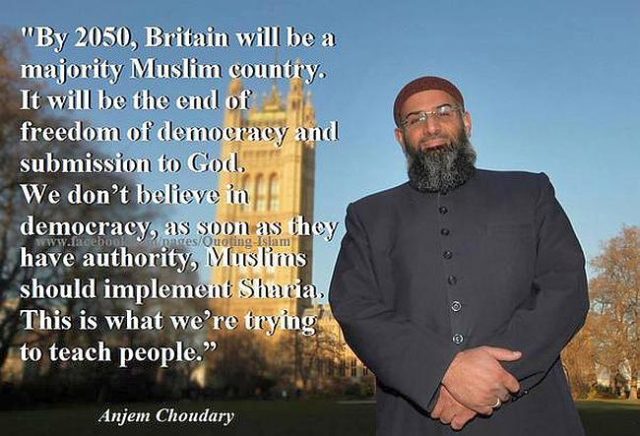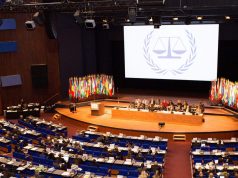.
By Rachel Ehrenfeld
February 25, 2023
Highlights of William Shawcross’s Independent Review* (Feb. 8, 2023)
In January 2019, the U.K. government announced the creation of an Independent Review of Prevent as part of the Counter-Terrorism and Border Security Act. William Shawcross, who was appointed a year later as the Independent Reviewer, published his review – including conclusions and recommendations on how to rectify the situation – on February 8, 2023. Not surprisingly, Muslim groups and Left-leaning academicians and media accused Shawcross of propagating “Islamophobia”.
Here are a few notable excerpts from his review. which, as expected, was:
“Other democracies have programmes similar to Prevent. But rarely are these subjected to the same critical attack as is Prevent in Britain. One of the most constant and strident accusations is that Prevent unfairly targets Muslims living here. This is simply not the case.”
“Islamism as an ideology is not the same as Islam as a faith. In many parts of the world, Muslims are the principal victims of Islamist extremism – in both its non-violent and violent manifestations. Millions have been killed or had their lives ruined by the attacks of terrorist groups like al-Qa’ida, Islamic State, Boko Haram, and others. It is not anti-Muslim to try to prevent the spread of that brutal ideology in Britain or to stop our country’s Muslim children being lured online into the hell of Islamist wars in Syria and elsewhere.”
“In conducting this Review, I have seen at first hand the essential work carried out every day by police, health workers, local authority and social services staff, teachers and prison officers across the country. It is they who take the onerous responsibility of raising concerns when they fear that individuals are at risk of being radicalised by dangerous ideologies – and then undertake the difficult work of supporting their withdrawal from extremist paths.”
“This is unsung and often dangerous work which should be praised. Instead, these men and women are too often abused by some bad faith actors who seek to undermine Prevent through distortions and disinformation. Such harassment is wholly unacceptable.”
“Prevent’s first objective – to tackle the causes of radicalisation and respond to the ideological challenge of terrorism – is not being sufficiently met. Prevent is not doing enough to counter non-violent Islamist extremism. Challenging extremist ideology should not be limited to proscribed organisations but should also cover domestic extremists operating below the terrorism threshold who can create an environment conducive to terrorism. Prevent has a double standard when dealing with the Extreme Right-Wing and Islamism. Prevent takes an expansive approach to the Extreme Right-Wing, capturing a variety of influences that, at times, has been so broad it has included mildly controversial or provocative forms of mainstream, right-wing leaning commentary that have no meaningful connection to terrorism or radicalisation. However, with Islamism, Prevent tends to take a much narrower approach centred around proscribed organisations, ignoring the contribution of non-violent Islamist narratives and networks to terrorism. Prevent must ensure a consistent and evidence-based approach to setting its threshold and criteria, and ensure it does not overlook key non-violent radicalising influences.”
“I was consistently unable to determine how many Prevent-funded civil society organisations (CSOs) and community projects are achieving impact. I found there were inadequate mechanisms to evaluate individual projects. Funding too often goes towards generic projects dealing with community cohesion and hate crime, and few CSOs could be seen publicly to contest extremist discourse. Of particular concern, I discovered that some CSOs have promoted extremist narratives, including statements that appear sympathetic to the Taliban. As a core principle, the government must cease to engage with or fund those aligned with extremism.”
”I was disturbed by the prevalence of antisemitism within the Channel cases I observed. Individuals discussed at Channel panels tended to harbour violent and fanatical beliefs about Jews, often expressing an intent to kill, assault or blow-up members of the Jewish community. Prevent must better understand and tackle antisemitism where it is relevant to its work. As part of this pursuit, Prevent work should cover UK extremist networks supportive of terrorist movements that explicitly target Jewish communities. Prevent should also better address the anti-Jewish component of both Islamist and Extreme Right-Wing ideology.”
(Channel “forms a key part of Prevent”, by offering support to those who present a terrorism vulnerability or risk.)
Islamism in the UK and overseas
“During this review, it was clear that the intelligence services continue to regard Islamist extremism as the enduring threat this country faces in the future. Islamism remains a multi-generational issue that shows few signs of being solved. The tragic events of the Taliban takeover in Afghanistan serve as a reminder of the difficulties of defeating Islamism overseas, while the October 2021 murder of Sir David Amess MP in Southend demonstrated once more the extreme and unacceptable dangers faced at home.”
“One aspect of the Islamist threat that warrants attention is the support network around Hamas, the Islamist terrorist group which controls Gaza and is committed to the destruction of Israel. The open support voiced in the UK for Hamas, including by those in senior political or community roles, is totally unacceptable. I welcome the government’s decision to proscribe Hamas in its entirety.”
“Latest Home Office Statistics Reveal 7 Late-Stage Plots Foiled Since March 2020’, Counter Terrorism Policing, 9 December 2021.
‘Man admits planting a “bomb” in Edinburgh’s Princes Street Gardens’, BBC News, 19 January 2022, available at:
Jamie Grierson, ‘Three terror plots foiled in Britain during pandemic, say police’, The Guardian, 4 March 2021.
Clea Skopeliti, ‘Peer is asked to investigate the activities of extreme right and left’, The Guardian, 8 February 2021.
The open support voiced in the UK for Hamas, including by those in senior political or community roles, is totally unacceptable.
In order for the proscription to be truly effective, those who fundraise for Hamas or break the law in support of the group’s activities must be prosecuted to the full extent of the law. There is no reason why those who support Hamas should be treated any differently to those who support Islamic State, National Action, or other proscribed organisations.
Going beyond proscription, the government should pay greater attention to the pernicious impact of Hamas’s support network in the UK. These companies and charities operate legally. This highlights the importance of arm’s length bodies such as the Charity Commission in helping formulate the most effective response.
Further, where legal claims are brought which touch on areas concerning extremism, it is important that cases are properly defended with the benefit of specialist advice and full resourcing by the government, which ought to include second and third legal opinions. The government’s wider agenda (as set out in the Conservative Party’s 2019 manifesto) to “combat extremism and do all we can to ensure that extremists never receive public money” must be fully considered.317
“The government should consult a wide array of expertise to be as comprehensively equipped as possible regarding the key networks, groups, and individuals who may make legal threats. I am aware that the Commission for Countering Extremism has been tasked to utilise knowledge from additional external sources into helping raise awareness within government around extremism. I regard this as a credible way forward for ensuring the government has sufficient knowledge to tackle such matters in the future.”
- “In recent years, in both Britain and continental Europe, there have been examples of family and friendship groups travelling abroad to join jihadist groups, and in some instances friendship and family networks have served as the basis for terrorism plots. For example, DfE research investigating cases of young people in UK education settings who had travelled or attempted to travel to Syria, found that over half of those included in the study had travelled with either family or friends. This included cases where a sibling or parents had played a radicalising role.”
- “There is a growing body of research to suggest that ‘lone actors’, usually considered to be individuals radicalised online and acting independently, often in fact have strong digital networks and communities influencing their activity, and rarely consider themselves to be alone. Prevent should not underestimate the influence of networks and communities, whether these communities are online or face to face.”
_____________
* Independent Review of Prevent was published by the U.K. Government on February 8, 2023.





